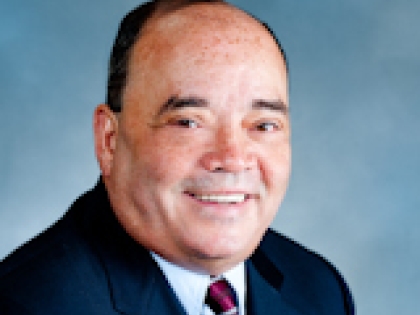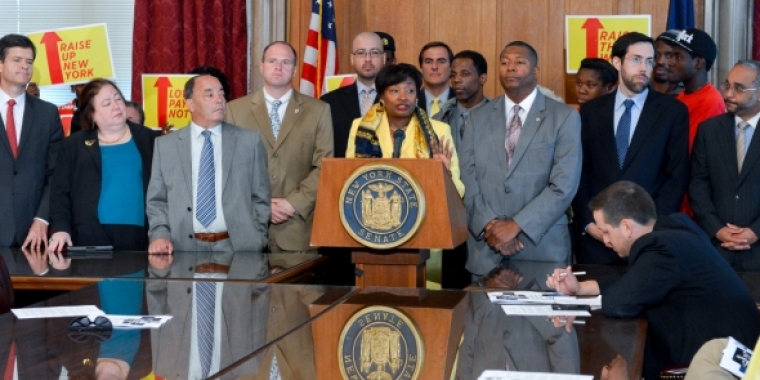
Raising the Wage: New York’s One-Size-Fits-All Wage Standard
Martin Malavé Dilan
June 4, 2014

By Lolita Avila
As the 2014 state legislative session winds down, the Senate Democratic Conference is making the case for a local minimum wage option. On Monday, June 2, the Democratic Conference released a detailed report showcasing the financial benefits of allowing local governments the ability to adjust wages to an appropriate regional standard. Senators who support the bill, including Senator Martin Malavé Dilan, would like to stop the endless penny-pinching, make-ends-meet cycle for New York’s minimum wage workforce. They called upon the Senate Republican/IDC coalition to help push the legislation through as soon as possible.
“The Senate Majority’s failure to adequately raise the state’s minimum wage has hampered economic growth and severely limited the purchasing power of millions of families throughout our state” said Democratic Conference Leader Andrea Stewart-Cousins.
A minimum wage increase measure was first introduced by Senate Democrats in 2012. The initial proposal called for wage increase of $8.50 per hour in 2013, where it would gradually increase to $9.25 by the following year. However, in the 2013-2014 Enacted Budget, the New York State minimum wage only increased $.75 cents, making the new wage $8 per hour. Although the new wage has proven to be successful in some regions of New York State, it’s impact has been uneventful in others.
“In a state as large and diverse as New York, we must realize that the wage required to live in New York City may be different from the wage needed in Buffalo or in Watertown” said Senator James Sanders Jr.
The conference report cited U.S. Department of Housing and Urban Development figures to show how short the “one size fits all” minimum wage model falls short of the mark. The figures noted that a three bedroom apartment in Buffalo is 43.3 percent of the cost of an equivalent apartment in the New York City and Long Island areas.
In addition—according to the Henry J Kaiser Family Foundation—the cost of living for a family of four in New York’s lowest-cost urban region is 43.2 percent of the state’s highest cost urban region, which is $211,645.
If enacted, Senate bill S.6516 will authorize local governments to meet the needs of their constituents by raising the minimum wage to an adequate standard without waiting for state rulings. This legislation will also increase the wage for “tip workers” who are generally paid less than state and federal minimums. Unsatisfied with the previous bill’s shortcomings, Senate Democrats would like to assure that the minimum wage will not have to be revisited in a few years because of insufficient adjusting.
“The current minimum wage is out of step with the everyday financial realities of working New Yorkers. The widening gap has left an entire generation struggling to make ends meet, all the while caring for the younger generation doomed to the same cycle. A real wage, indexed, with the flexibility for localities to adjust wages in accordance with local markets, is the only real light at the end of the tunnel for New York’s working families,” said Senator Dilan.
With the support of Mayor Bill de Blasio and Governor Cuomo, the wage hike ideally will soar to $10.10 by next year. However, this may be a tough fight without the full support of the ruling Senate Republican/IDC coalition.
The Senate Democratic Conference reiterated that half-loaf minimum wage compromises wont stimulate New York’s economy. In fact, it will prevent local economies from flourishing and continue to push hard workers towards the poverty line. It is time that New York State realizes the diversity of its residents and accommodates their financial needs.
Share this Article or Press Release
Newsroom
Go to NewsroomBrooklyn Power Outages, Service Restorations
October 30, 2012
Hurricane Sandy Emergency Preparedness
October 29, 2012

Second Annual Parents as Partners Week, Oct 15-20
October 10, 2012
